CONTENTS:
PRESIDENT’S MESSAGE
OUTGOING PRESIDENT’S MESSAGE
INTRODUCING THE NEW VICE PRESIDENT
INTRODUCING THE NEW SECRETARY
INTRODUCING THE NEW TREASURER
THE NEW TECHNOLOGY CHAIR
REVVIN’ UP FOR A GREAT ONE
PSWA WRITING COMPETITION
HED: SO LONG FOR NOW
MY WASHINGTON NATIONALS
THE BULLDOG AND THE HELIX: BOOK REVIEW
PLASTIC SCAM
WHAT GOES WRONG WHEN WRITING ABOUT CRIMINAL INVESTIGATION
KNOW YOUR GUN
MEMBER NEWS
PRESIDENT’S MESSAGE
Greetings PSWA members
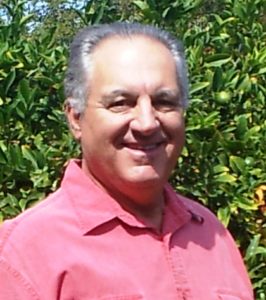
It has been a stressful and busy time since the 2019 conference. As soon as the conference ended, four of our board members tendered their resignations, with much regret, for understandable personal reasons; Michelle Perin, President; Thonie Hevron, Member at Large; Tim Dees, Secretary and Alpha Geek Extraordinaire; and Mysti Berry, Treasurer and Web Master. At first, there was much angst among the remaining members. Taken by surprise, it appeared, at first blush, this was a devastating blow to our organization.
Shrugging off the shock, we rallied and, working together, ended up bringing new board members on to fill those vacancies. Though Thonie, Tim, Mysti, and Michelle will be sorely missed as board members, we were confident the newly approved crew would be able to quickly step into their rolls and duties. That became evident at our mid-year board meeting at the Orleans Hotel/Casino Feb. 5 and 6. All quickly and enthusiastically, jumped into their duties, proving our confidence in them was justified.
The new board members are Gloria Casale, Secretary; Joe LeFevre, Web Master and Alpha Geek; Bob Calkins, Treasurer; Scott Decker, Vice President and Membership Chair; and Barbara Hodges as the Writing Contest Chair, taking over that role from our outgoing president, Michelle. One other change on the board is me (John Schembra) formerly the VP, now your President. Mike Black continues in his role as Conference Chair, and Marilyn Meredith is still the Newsletter Editor.
As the new board concentrates on planning and preparing our July conference, I encourage each of you to sign up and take advantage of the interesting, informative, and educational panels and keynote speakers. It’s also fun, the networking opportunities abound, whether it is with editors, or other talented member writers. After all, the board’s purpose is to provide the best possible conference to you, our members, and from the looks of it, and the hard work of Mike Black, it is well on its way to being one of the best ever.
Don’t forget the Thursday pre-conference workshop. Every writer, regardless of how much they have written, or how many books they’ve had published, can benefit from the expertise of the instructors. Our pre-conference Writer’s Workshop starts things off on Thursday, July 16th at 9:00 AM. The Workshop offers writers a chance to get one-on-one feedback and instruction on advanced writing techniques from the instructors—Mike Black, Marilyn Meredith, and Susan Tuttle. Included with the workshop are some special benefits for the attendees. Please check it out at the PSWA webpage.
I would like to gratefully thank Michelle, Tim, Mysti, and Thonie for their work on the board. Some of them spent 14 years, or more, as board members.
I am issuing a call to all our members to get involved with the PSWA by volunteering to help with some of the duties of planning the conference and helping at the conference itself. We are actively seeking members to shadow and assist Mike Black with the conference development and planning, and to shadow Marilyn Meredith with the newsletter. Our view is to the future, seeking those who will succeed us as board members when our time is done. If you are willing to help, contact Mike Black at docatlas108@aol.com, Marilyn Meredith at mmeredith24@ocsnet.net, or me at toto@pacbell.net .
I encourage you to sign up now for the conference and pre-conference workshop. The fee goes up after Apr. 30, 2020.
As the new President, I can promise you that your board will continue working to make the PSWA, and the conference, better every year. After all, our job is to work for our member’s benefit, not ours. To quote our out-going president, Michelle, “The Public Safety Writers Association is all about writing and making friends, making friends and writing. I hope all of you continue to grow within this organization.”
—John Schembra
Award winning author
PSWA President
OUT-GOING PRESIDENT’S MESSAGE
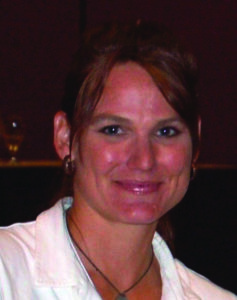 At the end of 2005, I was a budding writer and stumbled upon the Public Safety Writers Association website. I joined and that summer I attended my first conference. The members immediately welcomed me, inspired me and even gave me the opportunity to write a paid monthly column for Officer.com. I’ve been writing two columns a month for them ever since.
At the end of 2005, I was a budding writer and stumbled upon the Public Safety Writers Association website. I joined and that summer I attended my first conference. The members immediately welcomed me, inspired me and even gave me the opportunity to write a paid monthly column for Officer.com. I’ve been writing two columns a month for them ever since.
Marilyn Olsen, then President and Queen, asked me to help with the writing contest in 2007 which I gladly did. This brought me onto the Board where I sat as Writing Contest Chair until I took over as President several years ago. During this time, I helped wherever I could as the PSWA could not maintain its mission without the assistance of its volunteers. I learned so much including how to work cooperatively within a diverse organization and leadership skills. The PSWA has grown and evolved into a vibrant association and to continue that growth I helped bring on two new members of the Board last year and another two this year to replace outgoing members. I also decided to step down and let our VP John Schembra have a turn at the helm.
I’m still going to be around and working on my WIPs. Thank you all for trusting me to help lead this organization for the last 13 years. It’s been an honor.
–Michelle J.G. Perin-Callahan, MS, QMHP, EMT
Visit me at www.thewritinghand.net or www.forgottenfirstresponders.com
INTRODUCING THE NEW VICE-PRESIDENT
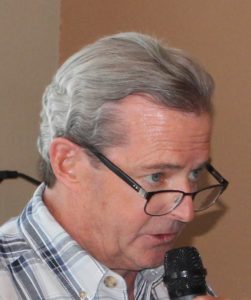
Scott Decker joined the FBI as a Special Agent and was first assigned to the Boston Division’s Bank Robbery Task Force. The cases he investigated are fictionalized in Ben Affleck’s blockbuster, The Town (Warner Bros Pictures, 2010). He has co-produced a short movie, History of FBI Firearms, narrated by Golden Globe winner, Jon Hamm. Scott has also appeared with Saundra Bullock in her action comedy, The Heat.
On September 12, 2001, Scott led a team of FBI Hazmat Officers to Manhattan where they established a command post at the edge of the Ground Zero destruction. His first book, Recounting the Anthrax Attacks—Terror, the Amerithrax Task Force, and the Evolution of Forensics in the FBI (Rowman, 2018) chronicles the investigation of 2001’s deadly mailing of anthrax spores. Recounting has won awards for narrative non-fiction, memoir and true crime.
Scott contributes to Knife Magazine and Security Management magazine and is working on a second nonfiction book revolving around true crime and terrorism. He lives in Las Vegas with his wife, Terry and a good-natured beagle mix and a possessive mini-pinscher, and the occasional guest coyote and red-tailed hawk. Please visit: www.rscottdecker.com.
INTRODUCING THE NEW SECRETARY
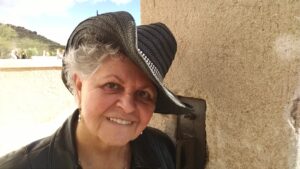 Gloria Casale lives in New Mexico, where she writes mystery novels for lovers of spy thrillers. She is currently working on An Emergency Medicine Memoir.
Gloria Casale lives in New Mexico, where she writes mystery novels for lovers of spy thrillers. She is currently working on An Emergency Medicine Memoir.
She earned her medical degree from the University of Kentucky and completed advanced training in anesthesiology, preventative medicine, and public health. She received training in bioterrorism and bioterrorism response at the United States Army Medical Research Institute of Infectious Diseases and is a recognized expert in the international transport of disease. Gloria also served as a consultant to the Division of Transnational Threats at Sandia Laboratory.
She also serves as the Vice President of Cloak and Dagger, the Albuquerque chapter of Sisters in Crime.
—Gloria Casale, Treasurer
https://www.gloriacasalewrites.com/
INTRODUCING THE NEW TREASURER
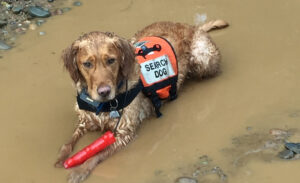 Robert D. (Bob) Calkins comes to the PSWA Treasurer position with experience managing the finances of his volunteer Search and Rescue group- which is also the foundation of his writing.
Robert D. (Bob) Calkins comes to the PSWA Treasurer position with experience managing the finances of his volunteer Search and Rescue group- which is also the foundation of his writing.
Bob has been a volunteer search and rescue dog handler for nearly 20 years, responding to everything from routine missing person cases to homicides to the horrific 2014 mudslide in Oso, Washington in which 43 people were killed. His current partner Ruger, an eight-year-old Golden Retriever, is certified for forensic-level human remains detection and works both active and cold homicide cases.
Bob retired from the Washington State Patrol in 2015 having served as the agency’s lead public information officer. He was previously the public information officer for Seattle-Tacoma International Airport, having served in that role during the 9/11 attacks, the 6.8 Nisqually Earthquake and a major airline crash.
—Robert Calkins
PSWA Treasurer
THE NEW TECHNOLOGY CHAIR
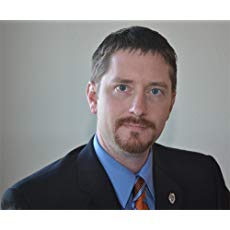 Hello, I am Joe LeFevre the new technology chair or Alpha Geek 2.0. Some of you may know me by my pen name, RJ Beam. I have been a member of the PSWA for five years, however, it has been a couple of years since being able to attend a conference.
Hello, I am Joe LeFevre the new technology chair or Alpha Geek 2.0. Some of you may know me by my pen name, RJ Beam. I have been a member of the PSWA for five years, however, it has been a couple of years since being able to attend a conference.
As the technology chair, I will keep our webpage up to date along with managing the email list-serve and social media. In addition, at the conference, I will be running the audio and visual systems.
My day job is working as an instructor at the Public Safety Training Center in Appleton, WI. Primarily I teach investigative skills along with conducting our officer fitness/wellness program. Prior to working in the academy, I was an officer and at one time was a volunteer firefighter.
As a nonfiction writer, I have had articles published in multiple publications including Evidence Technology Magazine, PoliceOne.com, and Law Officer Magazine. In addition, I have been part of a research team that has published our findings in the Society of Automotive Engineers Journal. Under the name RJ Beam, I have three mystery novels out, with more on the way.
On a personal note, I have a set of twins, ten-year-olds, a boy and a girl. They keep my wife and I busy taking them to karate lessons along with seasonal team sports. In my free time, I enjoy being active in the CrossFit community.
—Joe Lefevre (aka R.J. Beam)
Alpha Geek 2.0 and PSWA Webmaster
REVVIN’ UP FOR A GREAT ONE
I’m always amazed by the commitment of those stalwart individuals who comprise the PSWA and especially our board members. Our recent board meeting covered a lot of grounds and was particularly challenging due to the significant changes to the organization that occurred in 2019. While change is inevitable in life, it’s also a major stressor, so getting through it unscathed is always a challenge. I can say that we weathered the tempest and came through stronger and more committed to moving the organization forward than ever.
We’ve made a few changes to the conference this year, trying out some new stuff that will hopefully keep the experience informative and fun, while also maintaining the high standard of excellence you’ve come to expect from the PSWA Conference. This year has been labeled “Fifteen Will Get You Plenty” since it’s out 15th year. Our First Lady of the PSWA, Marilyn Meredith, has attended every one of them and has once again going to reprise her role as one of the three instructors for our pre-conference workshop. This year Marilyn and I will be joined by Susan Tuttle as our newest workshop instructor. Those of you who attended our 2018 conference will recall the fabulous presentation Susan did on self-editing. The workshop not only offers an opportunity to exchange ideas about writing and discuss various techniques, but it’s also an opportunity to have up to 30 pages of your manuscript critiqued by one of the instructors in a one-on-one session. It’ a great chance to take your writing to the next level.

We’ve got a dynamite line-up or solo presenters. Rannah Grey will be talking about her award-winning book, Familiar Evil, that was featured as the premier episode of a prime-time television show. She’ll cover the importance of framing a true crime story, promoting your book, submitting for awards, finding your audience through speaking opportunities and working with producers to stay true to your story. Don’t miss True Crime: From Publication to Premiere.
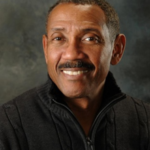
Successful author and publisher, Austin Camacho, will give you tips on improving your writing with his presentation, WRITE BETTER; DRAFT, REWRITE AND EDIT. Austin, who owns the prestigious Intrigue Press, has the unique perspective of being a writer, editor, and publisher and will show you how to improve your writing by focusing on several items an author should focus on as they write. But one thing that’s not obvious is that where a writer’s focus should be depends on what stage of the process he or she is in. Your process for writing a first draft is different from rewriting or editing a work. Austin will show you what you should focus on at each stage.

And, from the perspective of an author turned publisher, Mike Orenduff, will explain how a writer can go from unknown to best-seller. Mike’s highly regarded novels in his Pot Thief series has been the number one best seller on four occasions. The 8th book in the Pot Thief series, The Pot Thief Who Studied Edward Abbey, garnered a starred review from Publishers Weekly and sold over 10,000 copies before it even hit the streets. It’s not only an entertaining story, but it could work for you!
And rounding things out for the solo presentations is former FBI agent, Terry l. Kerns, who will be speaking about one of the most serious threats facing our nation today, the opioid crisis. Agent Kerns is the Opiate Coordinator with the Nevada Attorney General’s Office. She contributed to the Microbial Forensics textbook and has just been awarded a federal grant which will fund opioid risk training in the state of Nevada. This detailed overview of the current opioid crisis in America will explain how it has taken so many lives in our country in recent times.
We’re also working on a bunch of interesting and informative panels and a few other surprises that will keep you fascinated, as well as providing an occasional laugh or two. I hope to see you there.
—Michael A. Black
Program Chair
PSWA WRITING COMPETITION
 I’m delighted to be the new chair for the PSWA Writing Competition. The writing competition is one I’ve had the pleasure in taking part in numerous times, and I’ve even won a second place for published book and honorable mention for an unpublished short story.
I’m delighted to be the new chair for the PSWA Writing Competition. The writing competition is one I’ve had the pleasure in taking part in numerous times, and I’ve even won a second place for published book and honorable mention for an unpublished short story.
I don’t take those wins lightly, even more so now that I know how PSWA winners are chosen. Ours is not a contest where if you enter and pay your $10.00 you will win. If the entries received aren’t determined to be the best in their categories, then they won’t win. It’s that simple.
All entries are carefully judged by award winning authors, and a big shout out to those judges. We couldn’t do this without you!
Each year there is the possibility one or more of the categories will not have winners.
For your writing to be recognized as award winning by the PSWA judges is worthy of applause, which you will receive if you are chosen and are at our July conference’s award luncheon.
Becoming an award-winning author isn’t easy, but the PSWA Writing Competition is a great way to start. Those gold stickers look great, no matter where you choose to place them. So, come on, send us your best writing. There is a category for all.
The cutoff date is April 15th. Two weeks earlier than prior years. We want our judges to have plenty of time to review your works.
Check out the information on our website, fill out a downloadable form for each entry, and send the form along with your entry and your $10.00 entry fee for each to me, Public Safety Writers Association, 187 Alyssum Circle, Nipomo, CA 93444.
Also send an e-copy of your entry to me at…bassetbarb@aol.com. We want the e-copies too. Some of our judges prefer e-copies and some prefer reading your entries in print. I want the copies as back-up, just in case something happens to the print copies.
I think that’s all for now. I’ll be sending out reminders and we will have a countdown clock on our website.
Get those entries in and join us at the conference in July. I’d love to personally hand you your winning certificate.
—Barbara M. Hodges
PSWA Writing Competition Chair
HED: SO LONG FOR NOW
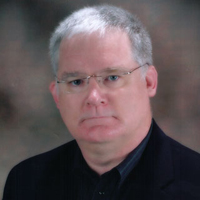 Your board of directors holds a brief meeting at the end of each conference to review the conference evaluations and discuss plans for the near future. At this most recent meeting at the end of the 2019 conference, I told the board, “I’m done.” I’m resigning from the board of directors, effective as soon as I can pass control of some elements to my successor(s).
Your board of directors holds a brief meeting at the end of each conference to review the conference evaluations and discuss plans for the near future. At this most recent meeting at the end of the 2019 conference, I told the board, “I’m done.” I’m resigning from the board of directors, effective as soon as I can pass control of some elements to my successor(s).
I’m not certain, but I think I’m the last “OG” (that’s street jargon for “original gangster,” one of the founding members of a criminal gang) remaining from what used to be the Police Writers Club. Not long after Roger Fulton created the PWC in the 1990s, he brought me on board as a consultant and web monkey to create and maintain a website and perform some other technical chores. When the PWC became the PSWA, I continued in that role, eventually being invited to join the board of directors as a member at large and the “Alpha Geek” technical person, and to manage the multimedia functions at the conference. I became the board’s secretary when Keith Bettinger resigned a few years ago. I eventually got out of my depth as a website designer/administrator. Those duties have been assumed by the inestimable Mysti Berry, whose geek chops are superior to my own.
I am not leaving the board out of any conflict or dissatisfaction. I’m just tired of traveling. Some years back, when I was the editor-in-chief of Officer.com and later LawOfficer.com, I found myself on an airplane at least once a month. That was fine for a couple of years, when I was living in a place (Laurel, MD) where I had few local acquaintances and my apartment was not much more than a place to do my laundry and sleep occasionally. Eventually, the travel went from “Where do I get to go now?” to “Where do I have to go now?” I knew I had reached saturation level when I (1) realized that I struggled to remember my phone number, but could repeat my Delta SkyMiles account number without thinking, and (2) woke up and knew I was in a Marriott hotel room, but wasn’t sure which city I was in.
My travel in recent years has been mostly to the annual conference and board meeting, but I’ve found I’ve been dreading those trips as they got closer. While I have great affection for my fellow board members and many of you in the PSWA as a whole, I’ve found I really prefer to hang out at home with my aging dog. We’ve been quietly canvassing for someone to step in for me for several years, but it became apparent that this wasn’t going to happen until I created a vacancy.
I’m working on a document to serve as a guide for whomever assumes the various duties I performed on the board, to include running the sound and projection/computer gear at the conference, creating the conference name badges, and administering the listserv. I have some experience with this. I work part-time for a sole-practitioner psychiatrist, mostly with IT and other technical tasks. At the doctor’s request, I wrote and continue to update a document that covers how I do what I do. The title of this document is “If Tim Drops Dead,” which I have on good authority will happen someday.
I plan to continue to be a member of the PSWA, and I hope that you’ll call on me at tim@timdees.com if I can ever be of service to you.
–Tim Dees is a retired police officer and the former editor of two major law enforcement websites who writes and consults on technology applications in criminal justice. He can be reached at tim@timdees.com.
MY WASHINGTON NATIONALS
It was September 23, 1957, and I was attending my first Major league Baseball game. My step-father took me. The game was at Griffths Stadium in Northwest Washington, D.C. Griffths Stadium was used by Major League Baseball from 1911 until 1961. It was Roy Sievers Night and Vice President Richard Nixon was there to present a plaque to him. Roy Sievers was the leading home run hitter for the Washington Senators. That year he surpassed Mickey Mantle and Ted Williams to win the home run crown with 42 homers. From that day forward I followed the ups and downs of the Washington Senators. Just as a side note Mickey Mantle once hit a home run out of Griffths Stadium that went 565 feet. Even though the Senators were cellar dwellers, in last place, they had two of the best homer hitters, Roy Sievers and Jim Lemon. Sievers was the first player in baseball history to have more home runs and runs batted in playing for a last place team. Unfortunately, love for the team and its players was dashed when in 1961, Calvin Griffith moved the team to Minnesota, and it became the Minnesota Twins. Fellow baseball lovers will remember Senator players like, Whitey Herzog, Harmon Killebrew, Chuck Stobbs, Eddie Yost, Pete Runnels or Clint Courtney, all who play during that time. It was said that the Washington team was “first in war, first in peace and last in the American League,” a little play on the words describing President George Washington after the American Revolution.
Griffths Stadium was a multi-sport and event facility. The Homestead Grays of the Negro Baseball League, who won 7 of 10 Negro National League Championships, also played there and actually drew more revenue for the Griffth family than the Senators. Josh Gibson, believed to be the most prolific home run hitter of the all-time with the Homestead Grays hit many homers out of Griffths Stadium. Unfortunately none were measured. The short lived Women’s Baseball league played there. The Washington Redskins first played there, as well as several college and high school football teams. In fact the highest scoring football game was played at Griffths Stadium, the Redskin defeat by the Chicago Bears 73-0. Joe Louis fought in Griffths Stadium and Billy Graham had several revivals there. They had dog racing in the stadium and wrestling matches. Duke Ellington and Langston Hughes as children actually sold hot dogs at the stadium.
In 1961, an expansion team was located at Griffths Stadium and continued to use the name Washington Senators. The last Senator game played at Griffths Stadium was played on September 21, 1961 to a crowd of 1498 fans. Their next season would be at RFK Stadium on East Capital Street in Northeast Washington. This team stayed at the bottom of their division for a number of years, but strangely enough whenever the New York Yankees came to town the Senators would beat them like they owned them. While I was in High School a couple of buddies and I went to a two-night doubleheader where the Senators were playing the Yankees. The first game the Senators beat them 8 to 1 and in the second game they beat them 13 to 2. This was the dynasty Yankees, Mickey Mantle, Yogi Berra, Roger Maris, Whitey Ford, Elston Howard, among others.
Frank Howard was the big home run hitter for the Senators then and when I said big I meant big. He was 6 foot 8 inches and 280 lbs, he hit 237 home runs for the Senators from 1965 until 1971. I remember taking my sons to a game at RFK and when Frank Howard was announced as coming to home plate to hit. My kids went wild. I said to them who is the best hitter on the Senator team? They yelled Frank Howard. Who is the best catcher on the team? Again they yelled Frank Howard. Who is the best pitcher on the team? They shouted Frank Howard again. Frank Howard was an outfielder, but they thought he was the best period. The Senators again left Washington in 1972 for better haunts and became the Texan Rangers. I was heartbroken and the kids weren’t too happy either.
In 2005, 33 years later, baseball returned to Washington, D.C. The Montreal Expos moved to our fair city and became the Washington Nationals. This time they would be a part of the National League in the Eastern Division. While Nationals Park was being build, the Nationals played at RFK stadium. As a police officer, I was deployed from the academy to the 5th Police District. RFK Stadium was in that district and I made sure I went there in uniform. The game was already over, but I walked around the ground level under the seats. I came to an opening that led into right field. I walked through the opening on to right field. I was a kid again, standing in right field. It was exhilarating, but short lived.
From 2005 to 2010 the Washington Nationals finished either 4th or 5th in this 5 team division. In 2011, they finished 3rd. From 2012 until 2019 they finished either 1st or 2nd in the division. In 2012 they won the division, but lost in the divisional series to the St. Louis Cardinals 3 games to 2. In 2014, they won the division, but lost in the divisional series to the San Francisco Giants 3 games to 1. In 2016, they won the division, but lost in the divisional series to the Los Angeles Dodgers 3 games to 2. In 2017, they lost in the divisional series to the Chicago Cubs 3 games to 2.
In 2019, they entered the playoffs as a wild card team, second in their Division, and had to play the Milwaukee Brewers one game to see who would play in the divisional series. They won and had to go to Los Angeles to play the Dodgers, who had won 106 games out the 162 games they played that year. Los Angeles had the home field advantage as the Nationals were the wild card team. They would play 2 games in L.A. and 2 games in D.C. and return to L.A. for the final game if necessary. It was necessary and to a stunned crowd the Nationals won and would advance to the National League Championship game against the St. Louis Cardinals. The Nationals won 4 straight games, 2 in St. Louis and 2 in D.C. As the National League Champions, they now had to play the American League Champions, the Houston Astros. Again, the Astros had home field advantage in this best of 4 out of a 7 game World Series, where they had won 60 out 81 home games in their 107-game winning season. The Nationals won the first 2 games in Houston, but upon returning the Washington lost the next 3 games. With their backs against the wall and down 3 games to 2, the Nationals again beat Houston in a come from behind fashion twice and became the World Series Champions. The last time a Washington team won the World Series was in 1924, but as you can see I followed these cellar dwellers from the late 50s, through the heartbreak of so many lost opportunities. I went to 6 games this season and watched many more on TV. This team never gave up and neither did I. They finally broke through the darkness to become the best team in Major League Baseball, my Washington Nationals. I can’t wait until next year.
I’ve always loved baseball. I was never good enough to make the schools’ teams, but I played boys club baseball for several years. I played in softball league at NASA, for an electronics company. I played softball when I was on the police department. In my 60s, I played hardball with a senior league for a couple of years. Just this year, at age 73, I played in a senior softball league. We ended up in 2nd place at the end of the season. Unfortunately, my knees are too bad to continue playing, but that is why the Nationals winning the World Series is such a big deal to me. They have become my surrogate for playing baseball. My way to still enjoy the game I love.
—Joseph B. Haggerty, Sr.
THE BULLDOG AND THE HELIX
BOOK REVIEW
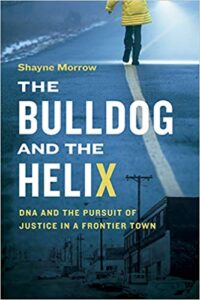 This is the true story of two separate murder investigations that were solved partly by good, old fashioned police work but significantly by the use of DNA evidence to prove the identity of the murderers. The two crimes happened in 1977 and 1996 in Port Alberni, British Columbia. Author and journalist Shayne Morrow traced the path of both investigations in great detail.
This is the true story of two separate murder investigations that were solved partly by good, old fashioned police work but significantly by the use of DNA evidence to prove the identity of the murderers. The two crimes happened in 1977 and 1996 in Port Alberni, British Columbia. Author and journalist Shayne Morrow traced the path of both investigations in great detail.
It’s not an uplifting book. The subject matter is too grim for that. But if you want to understand the intricate detail of how a real murder investigation unfolds with its many twists and turns this is a book for you. Author Morrow had access to the Royal Canadian Mounted Police investigators and developed a good understanding of how they solved these heinous crimes.
The Bulldog, Corporal Dan Smith, never gave up on the investigations, pursuing the cold case 1977 murder investigation for years until the arrest of the killer. I could sense his determination and perseverance as I read the book.
DNA evidence was in its infancy during the first investigation. The investigators were learning about it as they went along, all with the view that this new way of identifying murder suspects had to meet the legal requirements of a trial by judge and jury, including cross-examination. The book tells that story, from the murder scenes to the eventual courtroom trial. It’s a great read.
—John Eldridge
Author of Second Careers for Street Cops
PLASTIC SCAM
Credit Card Fraud Tops Nevada’s Identity Theft Victims
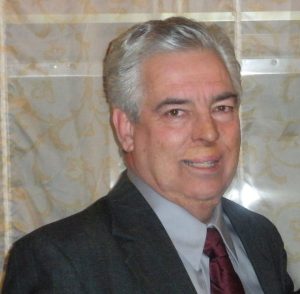
Not to scare or deter you, but here is something to consider when you are attending the PSWA Conference in July. According to the Federal Trade Commission’s (FTC’s 2018 stats), Nevada ranks # 5 behind Michigan, Florida, California and Maryland for identity theft (based on # of victims per 100,000 population). Forty percent of ID theft is through credit card fraud and misuse. And the top city in Nevada for this type of criminal activity? You guessed it . . . Las Vegas.
A few years ago, I was the victim of credit card identity theft. Fortunately, it was only for a small amount and my service company removed it. It only came to surface when my wife was examining the monthly billing statement and observed that we had been charged for a couple tickets: purchased on separate dates. She asked me if I had taken a couple Greyhound Bus trips from Texas to Nebraska. Seriously?
(Sure Honey. I left for work this morning, flew to Texas and grabbed a seat on Greyhound, rode to Nebraska, then flew back to my job with Metro in time to drive home and have dinner with you that evening…and I did it twice on two different dates. Did you miss me?)
Apparently, someone had used our card number, maybe a waitress or some other server that had temporarily taken our card. After two consecutive monthly billing statements of seeing these fraudulent charges and completing some disclaimer forms, our card company removed them from our statement. Anyway, where was I? Oh yeah . . ..
The Scam —
Credit card companies do have personnel watching out for unusual or extravagant expenditures on your credit card. When “red flags” appear on your report, these security “watch dogs” will call you and verify that you have authorized the payment. I’ve personally had this happen several times, usually after returning home from a vacation where the credit card was prominently used. (I guess that I’m going to have to quit spending so lavishly on my wife.)
Really though, I do appreciate this effort being made by my credit card company in an attempt to catch any suspected misuse of my card. However, this common security practice has recently led identity thieves to “work” the system and deceive card holders by portraying themselves as card company security personnel.
A typical con game will go something like this:
Someone pretending to be from Visa or Master Card (typically) will telephone and say, “This is Carl Patterson [fictitious name] and I’m calling from the Security and Fraud Department at Visa. My badge number is 12460. Your card has been flagged for an unusual purchase pattern, and I’m calling to verify. This would be on your Visa card issued by Chase Bank. Did you purchase an Anti-Telemarketing Device for $497.99 from a marketing company based in Arizona?”
When you say “No,” the caller continues with, “Then we will be issuing a credit to your account. This is a company we have been watching and the charges range from $297 to $497, just under the $500 purchase pattern that flags most cards. Before your next statement, the credit will be sent to (gives you your address). Is that correct?”
You say, “Yes.”
The caller continues, “I will be starting a fraud investigation. If you have any questions, you should call the 800-number listed on your card and ask for Security. You will need to refer to this Control #.” Then the caller gives you a 6-digit number.
“Do you need me to read it again?” The caller then says that he needs to verify you are in possession of your card. He tells you turn the card over and says, “There are seven numbers. The first four are 1234(whatever); the next three are the security numbers that verify you are in possession of the card. These are the numbers you use to make internet purchases to prove you have the card. Read me the three numbers.”
When you do, he says, “That is correct. I just needed to verify that the card has not been lost or stolen, and that you still have your card. Do you have any other questions? Don’t hesitate to call back if you do.”
All this sounds realistic and official, doesn’t it? Well, you were just scammed and unknowingly became the victim of credit card identity theft. It happened right after you gave the caller the numbers requested to verify the card was in your possession. You actually say very little, and they never ask for or tell you the whole card number.
Usually the unauthorized purchase(s) will be made within the next few minutes. You may not realize it though until you see your next billing statement, or when security personnel from the card company is alert enough to notice the high or unusual activity on your account.
What the scam wants is the three-digit number! And that once the charge goes through, they keep charging every few days. By the time you get your statement, you think the “promised credit” is coming, but it never does and then it’s harder to actually file a fraud report.
And don’t be surprised that should you receive a call like this and fall into their trap, that you will likely get another call a few days later from another credit card company, only this time the caller is identified by a different name, such as Jason Richardson [fictitious, of course] of Master Card. The interesting thing is that this new “security” person echoes nearly word-for-word the Visa scam dialogue. (It’s elementary, my dear Dr. Watson. I do believe these gentlemen are in cahoots with one another.)
Recommended Actions —
Should you get a call like this, get the person’s name and employee identification number, then tell him that you will call back and hang up. But do not call a number they refer you to. Call the customer service number on the back of your card. Once the company answers, they will be able to verify if there is an actual employee by that name/number. If not, then go ahead and inform them that you were just contacted in an apparent con attempt.
Don’t ever give out any portion of your card number. The real credit card companies want to reinforce that they will never ask for anything on the card (they already know). Be real careful giving any information out to an unsolicited caller. You can always call back the real company and, that way, be assured of whom you’re speaking with.
In the next newsletter, I plan on addressing Part-2 of scams with your checking account. I hope to see you in July at our conference.
Until then, Stay Safe!
—Ron Corbin
WHAT GOES WRONG WHEN WRITING ABOUT CRIME INVESTIGATIONS
We remember the things that bug us, and though novels/tv/movies get a lot of details right, panelists at this summer’s CrimeCONN conference had a long list of pet peeves. These included stories in which: surveillance is easy (and affordable); extradition happens almost overnight; judges make snap decisions about motions; and if it’s an organized crime case, there’s lots of electronic evidence. IRL, organized crime figures know what our politicians haven’t figured out: no emails, no texts, no Instagrams.
And here’s one of my eye-rollers: DNA evidence that comes back in 24 hours. At the same time, panelists agreed that a story that strictly followed what happens in an investigation or in the courtroom would be unreadable (and cited in this article).
They said witness testimony is often presented as too black-or-white. Either a witness is a truth-teller or a liar, when, in real life, witnesses do a bit of both. What’s more, they may not be intentionally lying, they may misinterpret something, they may misremember or simply forget.
For what goes wrong (and right) with movie spycraft, Wired provides this entertaining video with Jonna Mendez. It’s a follow-up to her previous film of CIA tips on developing an effective disguise.
—-Vicki Weisfeld
Twitter: @vsk8s
Website: Website: www.vweisfeld.com
KNOW YOUR GUN
Be instinctively familiar with what you carry.
Many of us are “gun nuts,” we enjoy shooting, and handguns have evolved so much in the past 50 years that virtually all manufacturers are creating truly fine working weapons. We often talk about our guns with our colleagues, both while we’re working and when we’re not. We boast about any newly acquired weapons and readily show them off to others.
Don’t get me wrong, I enjoy examining and shooting different handguns from the big, bad .45s to the tiny derringers. They’re all fun to shoot. But when it comes to using the weapons on the job and/or off-duty it’s imperative that you know that gun inside and out. I’ve had the experience of working as a firearms instructor for close to two decades. What I’ve seen on the range from self-described firearms experts sometimes scares the dickens out of me. Guys talk about the benefits of a certain firearm and its capabilities and about how this particular gun is a game-changer on the street. Once I put them on the firing line, however, it often turned into a disaster that ranged from not being able to control the weapon with mostly inaccurate shots, to being puzzled about the actual operation of the weapon. To make matters worse, they insisted they would carry the new gun either on the job or off-duty.
Knowledge is a powerful thing—in anything we do. Whether that knowledge is about how we do our job, or the tools we use to do it. One of the most important tools is the sidearm we’re carrying. It has the power to help us end a life or save one. In a critical situation, there’s no time to think about which gun we’re carrying and how it operates. No time to remember how we’re carrying it if we’re off-duty—is it in a pocket, waist band or holster, right side or left? Is the gun I’m carrying today the one with the manual safety or not? There’s no time to think about these questions, only time to draw and address the situation. Once in your hand, that gun becomes an extension of you. The operation becomes instinctive, that is, you look through your weapon at what is unfolding in front of you. Any firing or other manipulations happen automatically. Malfunctions, reloads, or whatever, are rectified without any thought process. It all happens automatically because you’ve become so familiar with that gun that you can operate it under any and all conditions.
So how do we get to that level? How do we reach the point of having that weapon in hand and not even remembering how it got there? Practice, practice, practice. To think you can achieve any level of familiarity of confidence with a gun without having practiced until you’re almost bored is lunacy. Live fire, along with dry fire, are equally important. Live fire for the muscle memory of presenting the gun and the feel of the discharge and felt recoil . . . the sights, trigger squeeze, coming back on target after multiple shots, those must be repeated actions that become second nature. Dry fire helps us make the gun comfortable in our hands while we practice drawing, acquiring a sight picture, and working with the trigger.
On the firing line is when we learn whether our chosen method of carry will work. Warm weather versus cold, heavy clothing versus t-shirts, etc. If you don’t practice under the conditions with which you will be deploying your weapon, expect to be farther behind the reactionary curve. You don’t want to give a potential adversary any more advantage than you must. What are the possible problems that you may encounter? Think about them and eliminate them at practice, not when the incident unfolds. Does your gun have a hammer that might get hung up on clothing when you try to present? Are you wearing your gun in a different place each time you leave the house? Are you carrying different weapons? If so, are you instinctively familiar with each one?
Unfortunately, we can’t expect to reach the level of competency that enhances our capability with our weapon by simply attending our department’s mandatory range dates. Depending on funding, quals vary from once per year to quarterly. Being on the range is always a time when we discover our shortcomings and sometimes our strengths. But range time offered by our departments is never enough. If you truly want to be instinctively familiar with what you carry, spend time working with the gun in your hand. Know how it feels with a one or two-handed grip, the weight of the trigger pull, the transition trigger, double to single, any safeties, slide locks, mag exchanges, mag releases—every aspect of the gun must be imprinted indelibly in your mind so that when that critical incident begins, you’re in the game immediately!
—John M. Wills
Website: jwillsbooks.com
MEMBER NEWS
From Scott Decker: I have been invited to:
1) Be the Keynote Speaker for the “11th Annual Research Day and Poster Session,” sponsored by the Research Institute of St. Joseph’s Health, St. Joseph’s University Medical Center in Paterson, NJ, May 22, 2020,
2) Be a panelist on “It’s Not All Fiction: A Talk with True Crime Writers,” at the Left Coast Crime 2020, Murder’s a Beach, conference in San Diego, March 14, 2020,
3) Participate in the Henderson Libraries’ “7th Annual Local Author Showcase,” in Henderson, NV, March 28, 2020.
—
Gloria Casale reports she will be a speaker at ‘Voices in Their Heads,’ the Croak and Dagger (Albuquerque’s Chapter of Sisters in Crime) Rhys Bowen Conference this March in Albuquerque;
She is also on the planning committee for the Left Coast Crime Conference to be held in Albuquerque 2021.
—
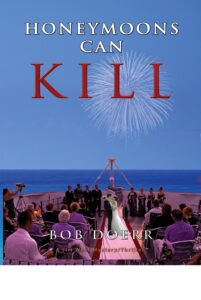 Bob Doerr is happy to announce that his new book, Honeymoons Can Kill was released in January and is now available. This is the eighth book in his Jim West mystery/thriller series and fifteenth book overall to be published. The story is set on a cruise ship that sets out from Galveston, TX, for a sail around the Gulf of Mexico with stops in Cozumel and Puerto Costa Maya. While still a stand -alone read, it is the first of his Jim West books that brings back characters from prior books. Hoping to have a peaceful cruise with a new lady friend, Deputy Rose Luna from Greed Can Kill, his plans are cut short when murder raises its ugly head.
Bob Doerr is happy to announce that his new book, Honeymoons Can Kill was released in January and is now available. This is the eighth book in his Jim West mystery/thriller series and fifteenth book overall to be published. The story is set on a cruise ship that sets out from Galveston, TX, for a sail around the Gulf of Mexico with stops in Cozumel and Puerto Costa Maya. While still a stand -alone read, it is the first of his Jim West books that brings back characters from prior books. Hoping to have a peaceful cruise with a new lady friend, Deputy Rose Luna from Greed Can Kill, his plans are cut short when murder raises its ugly head.
—
Jackie Taylor Zortman is thrilled with this review for her latest novella, JAKE-Echoes of Silence.
5.0 out of 5 stars It moved me to tears!
 Having enjoyed the first two novellas, I was excited for the third but had no idea it would be my favorite. Each story held surprises that gave me goosebumps, and the author skillfully built up my emotions with each tale. In Echoes of Silence, Jake is back in the town of Kimble, Colorado, where the scenery is gorgeous, mountains and women alike. While past mysteries are further explained, much to my satisfaction, new questions arise, making you keep flipping pages to find out if Jake can make it all work out. Along the way, we learn more about the rugged area and about the amazing world of wildfire fighting techniques. Things get complicated–the author weaves a compelling web. Near the end, I was moved to tears, then at the end, my mouth hung open…and that’s all I can reveal about that. Read the trilogy for yourself and enjoy the ride. —Review by ChillOnLake
Having enjoyed the first two novellas, I was excited for the third but had no idea it would be my favorite. Each story held surprises that gave me goosebumps, and the author skillfully built up my emotions with each tale. In Echoes of Silence, Jake is back in the town of Kimble, Colorado, where the scenery is gorgeous, mountains and women alike. While past mysteries are further explained, much to my satisfaction, new questions arise, making you keep flipping pages to find out if Jake can make it all work out. Along the way, we learn more about the rugged area and about the amazing world of wildfire fighting techniques. Things get complicated–the author weaves a compelling web. Near the end, I was moved to tears, then at the end, my mouth hung open…and that’s all I can reveal about that. Read the trilogy for yourself and enjoy the ride. —Review by ChillOnLake
(Available on Amazon.com)
—
The end of 2019 saw a hat trick of short stories by PSWA member Vicki Weisfeld. Her story “The Ghost Who Read the Newspaper” appeared in Seascape: Best New England Crime Stories. Stranded in a Connecticut country inn by a blizzard, two men encounter a notorious ghost. Who was he? Why is he haunting the Old Blackwood Inn? And what’s with that newspaper?
In its December issue, Mystery Weekly published “The West Texas Rookie,” in which a young Japanese American newspaper reporter finds herself in the old-boy environs of the Sweetwater, Texas, Register. Consistently given bottom-of-the-barrel assignments–including covering the annual Nolan County Rattlesnake Roundup–she takes on the reporting of a big homicide case deemed unsolvable.
“The Adventure at Sparremere Hall” appeared in Sherlock Holmes: Adventures in the Realms of Edgar Allan Poe. She says it was fun to channel Dr. John Watson in writing this one and put the Great Detective in Poe’s dark imagination! Ordering information is here
Website: www.vweisfeld.com
—
Ilene Schneider will be on a panel at LCC on Sunday, March 15, 10:15 AM, in Rio Vista A-H, on “Heaven Help Us: Religion and Spirituality in Mystery.”Her short story “Triangle” has been selected for inclusion in Jewish Noir 2, to be published in fall, 2020.Websites/Blog: https://rabbiauthor.com
Facebook: www.facebook.com/rabbi.author